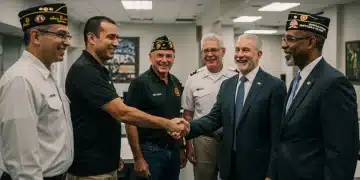Former veterans benefit overview: what you need to know

Former veterans benefit overview provides essential information on various support services, including financial aid, healthcare, education, and employment assistance tailored to improve veterans’ lives post-service.
Former veterans benefit overview is essential for those who have served our country. If you’re unsure about the support available, you’re not alone. Exploring what’s out there could open doors to incredible resources and assistance.
Understanding benefits for former veterans
Understanding the benefits for former veterans can greatly impact their lives post-service. Numerous resources exist, each designed to ease the transition and offer necessary support.
Key Areas of Assistance include healthcare, education, and financial aid. These benefits not only aim to support veterans but also recognize their sacrifices for the country.
Healthcare Benefits
Many veterans are eligible for comprehensive healthcare services. The Department of Veterans Affairs (VA) provides medical care that covers physical and mental health needs.
- Free or low-cost hospital visits
- Access to specialized care for service-related injuries
- Mental health services, including counseling
Educational Opportunities
Former veterans also have unique educational benefits. The GI Bill is a significant program that helps with tuition fees, allowing veterans to pursue their educational goals without the burden of student loans.
Additionally, vocational training and certification programs help veterans transition into civilian jobs more smoothly. This is essential in building a successful future post-military.
Financial Assistance
Financial help is another vital benefit. Programs provide monthly stipends, housing assistance, and unemployment benefits for veterans struggling to find work.
- Monthly compensation for disabilities
- Housing assistance for low-income veterans
- Job placement services to aid in employment
In closing, understanding these benefits is crucial for former veterans. They serve as a foundation for a supportive and successful life after military service, enabling veterans to access essential resources that recognize their sacrifices and needs.
Types of assistance available
There are several types of assistance available for former veterans that can significantly aid them in their transition to civilian life. Each type of support is designed to address different needs and challenges faced after military service.
Financial Assistance
Financial support is crucial for veterans. Various programs offer financial aid that helps cover essential expenses. This includes monthly compensation for disabilities, housing allowances, and grants for education.
- Disability compensation based on service-related injuries
- Housing assistance for veterans with low income
- Education benefits through the GI Bill
Healthcare Services
Access to healthcare is another vital aspect of veteran assistance. The Department of Veterans Affairs (VA) provides comprehensive medical services to ensure veterans receive the care they need. These services include regular check-ups, mental health counseling, and specialty care for chronic conditions.
Veterans are encouraged to utilize these services. They not only offer routine care but also provide urgent care for emergencies, making healthcare accessible when needed most.
Employment Support
Finding job opportunities after service can be challenging. Fortunately, there are resources that assist veterans in their job search. Employment support includes resume workshops, job placement services, and career counseling aimed at helping veterans successfully transition to civilian careers.
- Resume writing and interview preparation
- Networking events tailored for veterans
- Access to job listings specifically for veterans
These programs and services focus on enhancing the employability of veterans and ensuring they have the support needed to thrive in the job market. With the right assistance, veterans can build meaningful careers post-service.
Eligibility criteria for benefits

Understanding the eligibility criteria for benefits is crucial for former veterans seeking assistance. These criteria vary depending on the type of benefit and the specific program involved. It is important for veterans to know what is required to access the support they need.
General Eligibility Requirements
Most benefit programs have general requirements that veterans must meet. These typically include having served a minimum period in active duty, an honorable discharge status, and meeting specific income guidelines.
- Mandatory active duty service duration
- Honorable or general discharge
- Residency requirements in some states
Special Criteria for Specific Programs
In addition to the general eligibility, specific benefits may have unique criteria. For instance, healthcare services often require enrollment in VA health programs. Education benefits might depend upon prior military training and the area of study.
Veterans must provide necessary documentation to prove eligibility. This can include service records, DD Form 214, and income statements, which help to streamline the approval process. Understanding these requirements helps veterans prepare better when applying for benefits.
Exceptions and Special Cases
Some veterans may face special circumstances that affect their eligibility. This can include those who have been medically discharged due to injuries or disabilities acquired during service. In such cases, additional benefits may be available to support their unique needs.
- Service-connected disabilities may qualify for additional benefits
- Programs are available for veterans facing homelessness
- Survivor benefits for families of deceased veterans
By exploring these criteria, veterans can better navigate the system. Understanding eligibility not only simplifies access to benefits but also enhances the chances of receiving the necessary support to thrive post-service.
How to apply for veteran services
Applying for veteran services can seem overwhelming, but understanding the process makes it easier. Knowing where to start and what documents to prepare is essential for a smooth application.
Gather Necessary Documents
Before starting the application, it’s important to gather all required documentation. This typically includes your discharge papers, service records, and personal identification documents. Collecting everything in advance will save time and headaches later on.
- DD Form 214 is crucial for proving your military service
- Personal identification like a driver’s license or state ID
- Medical records if applying for healthcare benefits
Visit the Right Resource Centers
The next step in applying for veteran services is knowing where to go. The Department of Veterans Affairs (VA) has various offices and online resources that help veterans through the application process. Whether it’s local VA offices or official websites, they provide assistance with applications and answer any questions.
Many veterans also find it helpful to reach out to community organizations. These organizations often offer workshops and one-on-one assistance to guide veterans through the application process. It’s a great way to get support from those who understand the challenges veterans may face.
Complete the Application Forms
When you are ready to apply, fill out the required application forms carefully. Ensure that all information is accurate and complete. Mistakes or missing information can lead to delays in processing your application.
- Check for accuracy before submission
- Keep copies of everything you send
- Consider using online application tools for easier submissions
After submitting your application, it’s important to follow up. You can contact the VA to check the status of your application and address any issues that may arise. Being proactive helps ensure you receive the benefits you deserve more quickly.
Resources for veterans and families
There are valuable resources for veterans and families that can significantly improve their quality of life. These resources offer various forms of support, information, and assistance to help navigate the challenges that can arise after military service.
Government Resources
The government provides a wealth of resources for veterans. The Department of Veterans Affairs (VA) is the main agency dedicated to serving veterans and their families. They offer healthcare, educational benefits, and financial assistance through various programs.
- Veteran health services, including mental health support
- Education benefits under the GI Bill
- Home loan guarantees for purchasing homes
Community-Based Organizations
In addition to government resources, many community organizations are dedicated to supporting veterans. These groups often host events and workshops that provide networking opportunities, job training, and mental health resources.
Organizations such as the American Legion and the Veterans of Foreign Wars (VFW) offer local support, enabling veterans to connect with fellow service members and community members.
Online Resources and Support Groups
The internet is a valuable tool for veterans and their families. Numerous websites provide information on benefits, resources, and support networks. Online forums and social media groups allow veterans to share experiences and advice, creating a sense of community.
- Government websites for benefit applications
- Online support groups for mental health and wellness
- Job boards specifically tailored for veterans
Utilizing these resources can empower veterans and their families. By being aware of the support available, they can maximize their chances of receiving assistance and successfully navigating life after military service.
In conclusion, understanding the various benefits and resources available to former veterans and their families is crucial for a smoother transition to civilian life. From financial assistance and healthcare to educational support, these resources are designed to help veterans thrive. It is essential for veterans to be proactive in seeking out these services, ensuring they take full advantage of the assistance available to them. By connecting with the right organizations and gathering necessary documentation, veterans can navigate the application process and access the help they need. Empowering veterans with knowledge and support is key to honoring their sacrifices and improving their well-being.
FAQ – Frequently Asked Questions about Veteran Benefits
What types of benefits are available for former veterans?
Former veterans have access to various benefits including financial aid, healthcare services, educational support, and employment assistance.
How do I check my eligibility for veteran benefits?
Eligibility can be checked through the Department of Veterans Affairs’ website or by contacting local VA offices, where you can receive guidance based on your service record.
What documentation do I need to apply for veteran services?
Key documents include your DD Form 214, personal identification, and any medical records that are relevant to your application.
Are there community resources available for veterans?
Yes, numerous community organizations provide support, events, and resources tailored to help veterans and their families navigate challenges after service.





